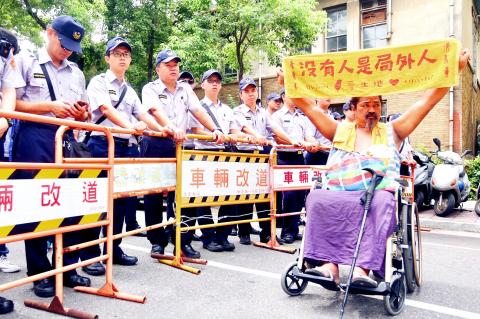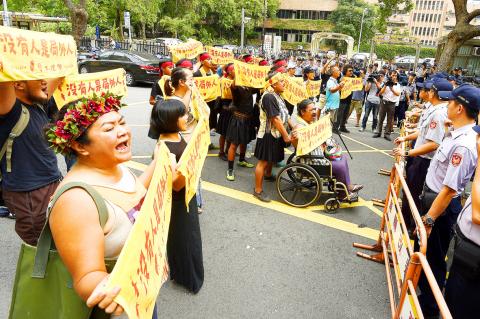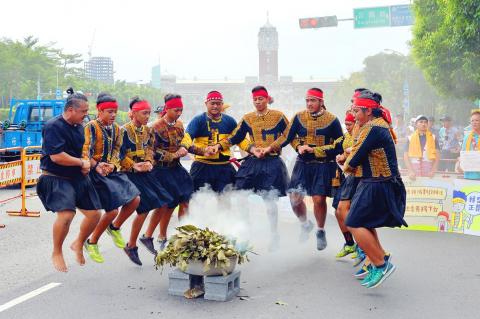Aboriginal rights campaigners yesterday condemned the government for having not carried out a promise to reinstate traditional Aboriginal territories, and they demanded that an independent agency be established to restore Aboriginal rights to land and transitional justice.
President Tsai Ing-wen (蔡英文) on Aug. 1 last year delivered a landmark apology to Taiwan’s Aborigines for their deprivation of rights in the hundreds of years since the mass migration of Han people began.
She promised to reinstate land rights, self-determination, economic development, cultural and language preservation and other rights protection.

Photo: CNA
Tsai yesterday said the government has worked to preserve Aboriginal languages and culture by immersing Aboriginal preschoolers and students in a learning environment where their native languages are spoken.
Aboriginal campaigners who have been staging a camp-out near the Presidential Office Building in Taipei for 160 days said Tsai had failed to keep her promises to restore Aboriginal rights.
They criticized the guidelines the Cabinet released on Feb. 14 on the delineation of traditional Aboriginal territories, which would restrict the application of the “traditional area” label to government-owned land, explicitly excluding private land.

Photo: Chen Chih-chu, Taipei Times
It would reduce recognized traditional territories from 1.8 million hectares to 800,000 hectares while companies would be allowed to develop traditional Aboriginal land that is now in private hands without the consent of local Aborigines, they said.
“Tsai promised that the government would prioritize the issue of traditional territories, but it turns out it is only limited to government-owned land,” Amis activist Panai Kusui said.
Documentary filmmaker Mayaw Biho, an Amis who has been an active member of the camp-out, called on the government to legislate an Aboriginal transitional justice law and establish an agency similar to the Cabinet’s Ill-gotten Party Assets Settlement Committee to investigate the deprivation of Aboriginal rights.

Photo: CNA
That would be a way to achieve understanding and reconciliation, he said.
The Presidential Office’s Indigenous Historical Justice and Transitional Justice Committee, which was established last year to understand the history of Aboriginal rights deprivation and reinstate those rights, does not have the necessary executive or investigative powers to perform its functions, Mayaw said.
“It is an irresponsible reform if the ruling party acts like it has done a lot and put in a great deal of effort in an effort to convince the public it is trying to tackle a problem,” Sunflower movement leader Lin Fei-fang (林飛帆) said.
Lin criticized Presidential Office Deputy Secretary-General Yao Jen-to (姚人多) and Democratic Progressive Party Legislator Kolas Yotaka for saying that the protesters do not respresent the nation’s Aborigines.
“Why can a person in power [Yao] be so careless about his authority, but treat protesters in quite a different way? What is the difference between the government and the Chinese Nationalist Party [KMT]?” Lin said.
The Executive Yuan said that efforts are under way to provide further protection to Aboriginal languages, land and resource rights.
The president has held talks with Aboriginal delegates, and the traditional territories delineation guidelines and landmark Aboriginal Language Development Act (原住民族語言發展法) have been promulgated, while legal rulings have been made to ensure that Aborigines could practice traditional hunting, fishing and harvesting, the Executive Yuan said.
The Cabinet has also completed the preliminary investigation into a government decision to deposit nuclear waste on Orchid Island (蘭嶼, Lanyu) without the knowledge and consent of the local Tao community when Chiang Ching-kuo (蔣經國) and Sun Yun-suan (孫運璿) were premier.
The Cabinet will create an institutional environment for the development of Aboriginal cultures and achieve transitional justice and harmony between ethnic groups, the Executive Yuan said.

MAKING WAVES: China’s maritime militia could become a nontraditional threat in war, clogging up shipping lanes to prevent US or Japanese intervention, a report said About 1,900 Chinese ships flying flags of convenience and fishing vessels that participated in China’s military exercises around Taiwan last month and in January last year have been listed for monitoring, Coast Guard Administration (CGA) Deputy Director-General Hsieh Ching-chin (謝慶欽) said yesterday. Following amendments to the Commercial Port Act (商港法) and the Law of Ships (船舶法) last month, the CGA can designate possible berthing areas or deny ports of call for vessels suspected of loitering around areas where undersea cables can be accessed, Oceans Affairs Council Minister Kuan Bi-ling (管碧玲) said. The list of suspected ships, originally 300, had risen to about

DAREDEVIL: Honnold said it had always been a dream of his to climb Taipei 101, while a Netflix producer said the skyscraper was ‘a real icon of this country’ US climber Alex Honnold yesterday took on Taiwan’s tallest building, becoming the first person to scale Taipei 101 without a rope, harness or safety net. Hundreds of spectators gathered at the base of the 101-story skyscraper to watch Honnold, 40, embark on his daredevil feat, which was also broadcast live on Netflix. Dressed in a red T-shirt and yellow custom-made climbing shoes, Honnold swiftly moved up the southeast face of the glass and steel building. At one point, he stepped onto a platform midway up to wave down at fans and onlookers who were taking photos. People watching from inside

Japan’s strategic alliance with the US would collapse if Tokyo were to turn away from a conflict in Taiwan, Japanese Prime Minister Sanae Takaichi said yesterday, but distanced herself from previous comments that suggested a possible military response in such an event. Takaichi expressed her latest views on a nationally broadcast TV program late on Monday, where an opposition party leader criticized her for igniting tensions with China with the earlier remarks. Ties between Japan and China have sunk to the worst level in years after Takaichi said in November that a hypothetical Chinese attack on Taiwan could bring about a Japanese

STREAMLINED: The dedicated funding would allow the US to transfer equipment to Taiwan when needed and order upgraded replacements for stockpiles, a source said The US House of Representatives on Thursday passed a defense appropriations bill totaling US$838.7 billion, of which US$1 billion is to be allocated to reinforcing security cooperation with Taiwan and US$150 million to replace defense articles provided to the nation. These are part of the Consolidated Appropriation Act, which the US House yesterday passed with 341 votes in favor and 88 against. The act must be passed by the US Senate before Friday next week to avoid another government shutdown. The US House Committee on Appropriations on Monday unveiled the act, saying that it allocates US$1 billion for the Taiwan Security Cooperation Initiative